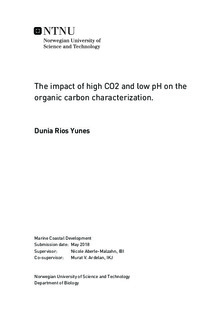The impact of high CO2 and low pH on the organic carbon characterization.
Master thesis
Permanent lenke
http://hdl.handle.net/11250/2504407Utgivelsesdato
2018Metadata
Vis full innførselSamlinger
- Institutt for biologi [2596]
Sammendrag
The atmospheric concentration of carbon dioxide (CO2) is increasing. Carbon capture and storage (CCS) provides a means to halt emissions. CCS under the seabed has some associated risks, such as seepage of CO2 from the storage site that in turn can cause localized ocean acidification (OA). The OA affects the marine chemistry and the different species of marine dissolved organic carbon (DOC) as well as the DOC transformation of the marine bacteria. These changes could potentially alter the long-term carbon storage capacity of the ocean. The CO2Marine project aimed to study the changes in the marine chemistry and bacterial degradation under high-pressure, long-term, low pH conditions. In this thesis, the intention was to study the effect that the low pH conditions would have on the DOC and the bacterial activity and to characterize the different DOC species with liquid chromatography- mass spectrometry (LC-MS). What we found was a decrease in the concentration of DOC and particulate organic carbon (POC) under low pH stress. The DOC compounds characterized were different between treatments and showed an apparent shift from negatively charged to positively charged. There was a higher bacterial degradation activity after low pH stress however; a decreased amount of recalcitrant DOC (RDOC) was produced. 11 potentially RDOC compounds were identified.
